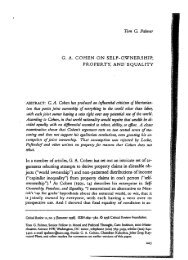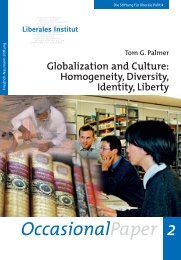Are Patents and Copyrights Morally Justified? - Tom G. Palmer
Are Patents and Copyrights Morally Justified? - Tom G. Palmer
Are Patents and Copyrights Morally Justified? - Tom G. Palmer
You also want an ePaper? Increase the reach of your titles
YUMPU automatically turns print PDFs into web optimized ePapers that Google loves.
824 HarvardJournal of Law & Public Policy [Vol. 13<br />
a single individual. It can leave his mind only in obedience to<br />
his will. It dies with him, if he so elect.” 23 Even granting the<br />
truth of the objection, he asks, do we deny private ownership of<br />
tangible objects because their creators availed themselves of<br />
pre-existing knowledge, or cooperated with others in their<br />
production? 24<br />
Spooner also refutes the objection that ideas are nonrivairous<br />
in consumption; that is, that the use by one person of<br />
an idea does not diminish anyone else’s use, <strong>and</strong> that ideas are<br />
therefore unsuitable c<strong>and</strong>idates for the status of property, by<br />
showing its consequences if applied to tangible property. For,<br />
if it be a true principle, that labor <strong>and</strong> production give no<br />
exclusive right of property, <strong>and</strong> that every commodity, by<br />
whomsoever produced, should, without the consent of the<br />
producer, be made to serve as many persons as It can, without<br />
bringing them in collision with each other, that principle<br />
as clearly requires that a hammer should be free to different<br />
persons at different times, <strong>and</strong> that a road, or canal should<br />
be free to as many persons at once, as can use it without<br />
collision, as it does that an idea should be free to as many<br />
persons at once as choose to use it. 25<br />
The key to Spooner’s approach is to deny those defenses of<br />
property that rest on the joint operation of scarcity, the law of<br />
the excluded middle, <strong>and</strong> the desirability of avoiding violent<br />
conflict. He writes, “The right of property, or dominion, does<br />
not depend, as the objection supposes, upon either the political<br />
or moral necessity ofmen’s avoiding collision with each other,<br />
in the possession <strong>and</strong> use ofcommodities.. ~ Rather, “the<br />
right of property, or dominion, depends upon the necessity<br />
<strong>and</strong> right of each man’s providing for his own subsistence <strong>and</strong><br />
happiness; <strong>and</strong> upon the consequent necessity <strong>and</strong> right of<br />
every man’s exercising exclusive <strong>and</strong> absolute dominion over<br />
the fruits of his labor.” 27 Similarly, the argument that the propagation<br />
of an idea is like the lighting of one c<strong>and</strong>le by another,<br />
illuminating the former without darkening the latter, would<br />
“apply as well to a surplus offood, clothing, or any other commodity,<br />
as to a surplus of ideas, or—what is the same thing—to<br />
28. Id. at 58.<br />
24. See id. at 61-64.<br />
25. Id. at 79.<br />
26. Id. at 81.<br />
27. Id. at 81-82.











